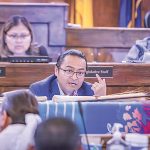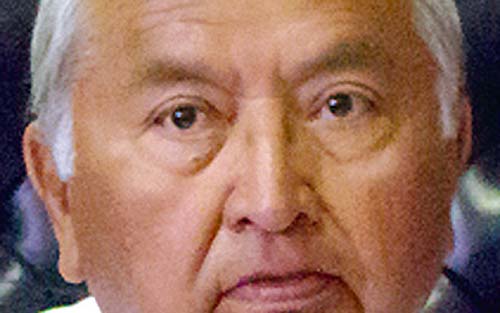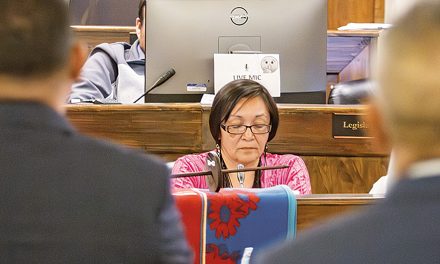
Guest Column | Finding a structure based on Diné life
By Herb Yazzie
I have lately been participating in informal community discussions on governmental and land-use reform, both of which no doubt go hand in hand.
Why has a Diné governmental structure not yet been found that grows out of Diné life and that would be of practical use to our realities? Why have we not found a land governance system that reflects our familial Diné land realities? These are the questions.
Over the years, Diné leaders have attempted to take our people beyond colonized thinking, by asserting that we have our own value system on which to base all governmental action. In 2002, Diné bi beenahaz’áanii (Fundamental Law) was established, through which we asserted that we will think this way, the Diné way.

Retired Navajo Chief Justice Herb Yazzie
We further asserted that our government will be founded on Diné bi nahat’á.
However, how we will live and govern as a people continue to be in the hands of lawyers who thrust upon us pieces of laws that, when viewed together, is shapeless, unduly complex, and unnurturing, not unlike destructive nayée.
People are restrained by lawyers from even expressing a comprehensive vision of what our government, Diné bi nat’áá, our lands and our way of life will look like. The temporary structure now in place in Window Rock is copied from Washington.
The lease and permit system of land, that the tribe has adopted, was imposed on us by those who did not expect reservations to be permanent.
Even our Navajo Nation Code was copied from surrounding states. None of these create a coherent whole that allows us to pursue our familial, our cooperative way of life, that gives the Navajo Nation a reason to exist.
Piece by piece, Window Rock has pursued enactment after enactment with no plan that envisions how our government and land systems must look like, and how they must operate for our descendants to remain on the Navajo Nation and exercise their ingenuity and stewardship. Envisioning has been put aside for someone else to get done.
Every Diné knows that the lack of a vision has deepened our colonization and made things worse for all Diné. A unified vision – for what the Navajo Nation will look like for our children and future generations – is the only way to decolonize our thinking.
A unified vision for why we exist, and how we will exist for generations, these are critical. This vision has to be expressed in Diné bizaad and in the English language.
Law-making without a comprehensive tribal vision puts inordinate power into the hands of lawyers who advise our elected leaders and our courts. When we are unable to plan our own reality, the lawyers are the ones who tell communities what can and cannot be done within the existing framework of laws that come from somewhere else.
Yet, these same lawyers would admit that the power currently exercised by them, can and should be in the hands of our communities, so long as we can agree on a foundational vision that serves as the basis of all laws. Such a foundational vision would be the basis for reform of all present tribal laws and the creation of future laws.
Such a vision would be an expression of our sovereign authority as a Nation. We would then work with Wááshindoon to waive or remove multiple federal law restrictions that the federal government has long underfunded and which the federal government itself knows are unworkable for permanent tribal communities.
Current federal Indian policy has encouraged such a tribal vision for each tribe since the early 1990s, especially in the area of integrated resource management. We, ourselves, have not risen to the challenge. We have not acted upon our communities’ desire for reform.
Every election, we criticize people who run for office. “You mention reform, where is it?” is always the question in our recent history. The return to fundamental law has become formalities without substance.
Presidential candidates talk about preserving our traditions, language and our way of life, but they and we have never undertaken the hard task of developing the vision, and launching a new government based on the vision.
We fault our leaders for not correcting this or that law. We condemn the lawyers for setting limits on what can be changed for our benefit. We fault our three-branch tribal government for being dictated to by the lawyers. Yet, the true fault is us.
We Diné need to envision our Nation’s land-based structure, our government structure, and our legacy for future generations.
It is well past a critical time to reach our consensus.
There is no doubt that lawyers have been in charge of us, to the extent that we do not recognize our way of life in our own tribal laws. In almost every instance, the lawyers are unfamiliar with Diné customary daily life – our ceremonies, our relational arrangements, our stewardship role.
Without knowledge of our arrangements, lawyers who draft our laws and advise our leaders cannot uphold us. Meanwhile, our leaders rely on their “expertise.”
There is an insight, that I have, from my 50 years of being advised by lawyers who impress upon us the need for compliance with laws. There are many who believe their job is to press human beings into existing boxes. Overall, lawyers lack imagination. They fulfill their contractual duties.
What the lawyers do not realize is the extent to which they control and limit us without asking us in a manner that would help decolonize our thinking. The limitations imposed by various interpretations of laws prevent our communities from even daring to express how the preservation of our way of life, our government, and our land use should be done.
How we are governed and how we use our land are the most fundamental and specific visions we need to make ourselves, subject to no artificial limitation. The three-branch Anglo form of government that is now in place in Window Rock was never intended to last as long as it has (more than 30 years).
The temporary land-use system of individually-held land leases and permits was never intended to be the method of governing ancestral land use among ourselves.
An awful example of unintended results is the designation of Local Governance Act chapters as “political subdivisions,” a term slipped into the LGA by lawyers, that is, borrowed from off-reservation uses. This term has resulted in the chapters not being able to directly be given ARPA money due to their being structurally separate from Window Rock, yet at the same time, are deemed lower levels of government subject to Window Rock controls.
This was not the original intention of community leaders, who recognize that local governance preceded the creation of the Window Rock government. A model closer to the local autonomy intent would be the “tribal enterprise,” or “home rule,” some kind of indigenous variation of these that we must develop, which operates independently.
What we need to think and create for ourselves, exercise our inherent self-governance, is a local autonomous model that can be entirely of our own envisioning.
There are some basic areas of agreement that can be built on. We want to preserve the Navajo Nation for future generations in a manner that makes sense and gives pride for us to exist as a Nation. We want to support the distinct and principled self-sufficiency of the Diné family.
We want to support Diné youth who increasingly seek to establish some kind of “cooperative” that integrates land use, business, and homesteading in a way that makes human sense.
We want local autonomy and responsibility for local matters, including disputes, daily life, and conservation matters. We want stability, livelihoods, in a manner that our youth may have ingenuity, and raise their own children as Diné.
We want relationships with land that reflect Diné life as practiced or as Diné life may be restored. We want a land system that does not create conflicts between us and even within families.
We want a governmental system that belongs to us and which looks like real life to us. We want to fully participate in the management of our lives and our land. We want the land base of the Navajo Nation to be preserved.
There is this notion that any government must be supported by the people. In order to get that support, people have to feel that they help create or develop that Nation. It’s our government. We complain about lack of people’s involvement, apathy, lack of initiative. To me, that comes from a feeling that this is not our government.
Navajo Nation presidents and Council delegates always use this word, táá hó ajít’éego, which they explain means “you have to be self-sufficient.” This is even emphasized in Diné wellness models taught at the Indian Health Service, in which it seems to be emphasized to our people that they must rely on their own self-help.
Yet, Window Rock takes no measures to establish a government and system in which self-sufficiency is truly supported. Window Rock should understand the other interpretation of táá hó ajít’éego, which is, “it’s up to you to make good things happen.”
We must take it upon ourselves to now verbalize and document our foundational vision. Good things will follow.
Now let us come together to envision the specific systems, structures and patterns. It is not yet too late.
Herb Yazzie is a retired chief justice of the Navajo Nation Supreme Court.








 Highway 264,
Highway 264, I-40, WB @ Winslow
I-40, WB @ Winslow